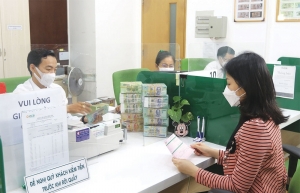Banking institutions expect advances
In Vietnam, 2024 forecasts from financial institutions are optimistic, primarily due to policies for reducing interest rates and bolstering digitalisation.
Phan Duc Tu, chairman of BIDV’s Management Board, reported that by the end of 2023, the bank had comprehensively fulfilled all targets set by the State Bank of Vietnam (SBV).
The total scale of assets reached over $95.35 billion. Credit outstanding reached $73.84 billion, growing by 16.6 per cent. Credit capital was concentrated in priority sectors and growth drivers in line with the government and the SBV directives.
BIDV, in particular, vigorously implemented the government and SBV directives in executing credit programmes, facilitating access to credit for enterprises and citizens, restructuring debts, initiating new loans, reducing, exempting interest rates, and fees.
“With all these measures, in 2023, BIDV reduced profits by nearly $248.94 million to support customers in overcoming difficulties, maintaining, recovering, and developing business operations,” Tu said.
At Agribank, Pham Duc An, chairman of the Council of Members, revealed that within their financial capability, Agribank had implemented 8 per cent interest rate reductions for various customer segments, with the highest reduction rate being 4 per cent per annum.
Cumulatively, in 2023, the total interest amount Agribank supported for customers was approximately $204.6 million. Agribank deployed 13 preferential credit programmes worth $8.44 billion with lower interest rates by 2-3 per cent per annum compared to normal lending rates. Simultaneously, they implemented policies to restructure loan repayment periods while maintaining a specific group of loans for customers facing difficulties in cash flow repayment.
According to the chairman of Agribank, by the end of 2023, Agribank had achieved targets such as raising capital of $79.74 billion, with outstanding loans of $65.4 billion, of which over 60 per cent were allocated to agriculture, farmers, and rural development schemes, with a bad debt ratio lower than the SBV’s target.
Contributions to the national budget were in line with commitments to ensure an increase in Agribank’s charter capital to $721.5 million, as outlined in the plan presented to the National Assembly.
 |
| Banking institutions expect advances, illustration photo/ Source: Shutterstock |
Focus on priority sectors
Disregarding the profit figures for the year 2023, Tran Minh Binh, chairman of VietinBank’s Management Board, revealed that the bank’s credit balance was propelled right from the beginning of the year, consistently maintaining a higher level compared to the industry average. By the year-end, it reached 15.6 per cent, contributing an additional $8.44 billion to the economy.
“VietinBank effectively implemented government and SBV policies, such as interest rate support, with a debt balance of $506.3 million, marking the highest interest-supported debt among other credit institutions. Moreover, there was a strong focus on lending in priority sectors as per the government’s directions, accounting for about 40 per cent of the total debt portfolio,” Binh said.
Similar to VietinBank, Luu Trung Thai, chairman of MB’s Management Board, said the bank’s credit growth in 2023 reached 28.8 per cent, with debt for priority sectors, according to government guidance, making up 65 per cent.
MB adjusted interest rates seven times in 2023, with reductions of 2-4 per cent to aid customers in accessing capital, contributing over $324.9 million to the state budget. Simultaneously, stringent credit quality control was maintained, with the group’s bad debt ratio at approximately 1.44 per cent and the bank’s standalone ratio at 1.23 per cent.
According to the investigation into the business trends of credit institutions and foreign bank branches in Vietnam conducted by the SBV, the business situation and pre-tax profit of the banking system in the fourth quarter of 2023 slightly improved compared to the previous quarter but fell significantly short of the expectations recorded in the earlier survey.
In an overall assessment of 2023, financial institutions concluded that the business performance fell short of expectations. Moreover, there was a notable downward adjustment in the expected growth rate of pre-tax profits compared to the previous forecast. Specifically, 78.6 per cent of these institutions foresaw a positive growth in pre-tax profits for 2023 compared to 2022, and 17.9 per cent of which predicted a decline, while 3.6 per cent estimated no change.
In an interview with VIR, a senior leader at BIDV pointed out the complex and unpredictable macroeconomic landscape in recent times had posed enormous challenges for the SBV in balancing its objectives. However, with expectations that central banks worldwide are gradually moving towards keeping pressures on exchange rates and inflation within control, the SBV is expected to continue reinforcing its loosening orientation in 2024.
“The SBV is likely to implement similar tools and solutions as in 2023, in a flexible and stringent manner,” he said. “Specifically, alongside open market tools to support liquidity, it plans to focus on implementing credit-boosting measures, such as extending debt restructuring, maintaining loan groups, adjusting credit limit policies, and urging credit institutions to continue reducing lending rates.”
Significant factors
Ngo Dang Khoa, director of Foreign Exchange, Capital Markets, and Securities Services at HSBC Vietnam said that given the global outlook stabilising and inflation remaining at a moderate level HSBC’s research team anticipates the SBV to “uphold the base interest rate” in the immediate future.
Per the survey results conducted by the SBV, 71.6 per cent of credit institutions evaluated internal factors as having enhanced their operational performance in 2023, with an overwhelming 81.8 per cent of these institutions expecting improvements in 2024. Conversely, 7.3 per cent of credit institutions believed that internal factors had deteriorated their performance in 2023 and foresaw a continuation into 2024, primarily attributing this to the financial capability of the entities.
“Policies regarding the unit’s interest rates, credit facilities, and exchange rates were persistently rated by about 72 per cent of credit institutions as the most substantial internal factors positively influencing their business performance over three consecutive quarters in 2023, and for the entirety of both 2023 and 2024 as selected by 80.5 per cent of credit institutions,” Khoa added.
Regarding external factors, credit institutions deem the policies of the SBV on credit, interest rates, and exchange rates as the most crucial factor that improved their business performance throughout 2023, and expected it to continue its impact in 2024, according to the survey results.
This was followed by “economic demand for the unit’s products and services” and “business and financial conditions of the customers.” For 2024, credit institutions anticipate a more favourable impact from all external factors compared to those observed in 2023.
“With the business performance and pre-tax profit in 2023 growing at a lower-than-expected rate, credit institutions anticipate a more optimistic business outlook starting from the first quarter of 2024 and continuing throughout the year, although the recovery of pre-tax profits might be slower than the overall business performance,” the SBV report said.
| Ramachandran A.S, CCO, Citibank in Vietnam
Reflecting upon 2023, it was another challenging year for the management of monetary policy and banking operations in Vietnam. The country faced multiple difficulties from both inside and outside of Vietnam. Despite these immense pressures on the banking sector, the government and the State Bank of Vietnam (SBV) on yet another year of impressive leadership and management of monetary policies and banking operations. This translated into remarkable economic performance, with GDP growth of 5.05 per cent in 2023, which was much higher than our regional peers and the global rate. Additionally, inflation was well-controlled at 3.8 per cent. Vietnam also achieved a 5-year foreign direct investment peak, underscoring its appeal as a prime manufacturing location, trade partner, and investment destination. Throughout 2023, the SBV undertook significant monetary policy actions, including four policy interest rate cuts, ensuring liquidity, controlling non-performing loans, and promoting digital transformation and green banking initiatives. These strategies played a crucial role in providing economic stimulus and supporting businesses during a period of economic difficulty, enhancing the health and operational efficiency of the banking sector. As a testament to these accomplishments, the international community has shown trust and appreciation for Vietnam. Notably, the US Treasury did not list Vietnam as a currency manipulator, and the national credit rating of Vietnam increased in 2023. Vietnam was also named one of the three best countries in the world in the Global Finance Central Banker Report Cards 2023. Looking towards 2024, foreign credit institutions are filled with optimism and eagerly anticipate the opportunities and challenges of the year ahead. We highly appreciate the government and SBV’s continued effort and determined direction to improve the legal framework, mechanisms, and policies in accordance with international practices and standards. There are four key areas that should be focused on in 2024. First is balancing inflation and growth, continuing the vigilant control of inflation while supporting sustainable economic growth. The second area is cashless payments and digital transformation, through enhancing efficient payment systems with an emphasis on leveraging digital transformation, promoting robust financial inclusion, and supporting overall economic growth. Third is strengthening sustainable banking practices to align with global environmental conservation initiatives, with a focus on the social and governance aspects in addition to the environment. Vietnam needs large investments in the energy and infrastructure sectors to ensure that the build-out in these sectors follows a holistic approach that creates a balanced and sustainable banking ecosystem. This ecosystem should support ethical practices, promote social welfare, and adhere to robust governance standards. This integrated focus will guide our initiatives and collaborations for a more sustainable and responsible banking industry in Vietnam. The final aspect is enhancing the legal framework to ensure the safety of the banking system and align with international practices. Particularly, the issuance of the amended Law on Credit Institutions and relevant regulations will strengthen the legal foundation of Vietnam’s banking sector. Citibank, representing the banking working group – one of the most active working groups of the Vietnam Business Forum – at the 2024 Mission Implementation Conference hosted by the SBV, emphasises that members are fully committed to bringing not only the latest technology and innovations but also the latest in safety and knowledge sharing to enhance Vietnam’s banking sector and the country’s continued progress. Our strong relationship and open dialogue, particularly through various discussions and workshops with SBV leaders and respective departments, have been integral in shaping effective and practical regulations. |
 | Green vision rises in finance-banking Experts are to shine a light on Vietnam’s efforts towards realising its committed green vision, particularly in the finance and banking sector. |
 | Vietnam readies for Open Banking revolution with new legal framework The State Bank of Vietnam (SBV) announces a major regulatory overhaul for Open Banking, with comprehensive legal guidelines and circulars expected to come into effect by July 2024. |
 | Banks grasp practicalities of open API Some Vietnamese lenders are increasingly adopting open API technology to enhance the customer experience and streamline services, amidst rising concerns over cybersecurity in the open banking ecosystem. |
 | Experience desired for banking reform Vietnam’s banking sector, amid urgent restructuring led by key players and government efforts, is confronting unique challenges due to limited restructuring experience and the complexity of securing investors. |
What the stars mean:
★ Poor ★ ★ Promising ★★★ Good ★★★★ Very good ★★★★★ Exceptional
Related Contents
Latest News
More News
- Cashless payments hit 28 times GDP in 2025 (February 04, 2026 | 18:09)
- SSIAM and DBJ launch Japan Vietnam Capital Fund (February 04, 2026 | 15:57)
- Banks target stronger profits, credit growth in 2026 (February 04, 2026 | 15:43)
- Vietnam on path to investment-grade rating (February 03, 2026 | 13:07)
- Consumer finance sector posts sharp profit growth (February 03, 2026 | 13:05)
- Insurance market building the next chapter of protection (February 02, 2026 | 11:16)
- NAB Innovation Centre underscores Vietnam’s appeal for tech investment (January 30, 2026 | 11:16)
- Vietnam strengthens public debt management with World Bank and IMF (January 30, 2026 | 11:00)
- Corporate bond market poised for stronger growth cycle (January 28, 2026 | 17:13)
- Vietnam's IPO market on recovery trajectory (January 28, 2026 | 17:04)


 Tag:
Tag:


















 Mobile Version
Mobile Version